
Henry Jackson Jr. was an American professional boxer and a world boxing champion who fought under the name Henry Armstrong.
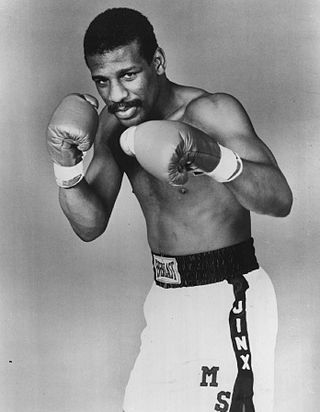
Michael Spinks is an American former professional boxer who competed from 1977 to 1988. He held world championships in two weight classes, including the undisputed light heavyweight title from 1983 to 1985, and the lineal heavyweight title from 1985 to 1988. As an amateur he won a gold medal in the middleweight division at the 1976 Summer Olympics.
Jesús Carlos Zárate Serna is a Mexican former professional boxer who competed from 1970 to 1988, and held the WBC bantamweight title from 1976 to 1979.

Edward Patrick "Mickey" Walker was an American professional boxer who held both the world welterweight and world middleweight championships at different points in his career. Born in Elizabeth, New Jersey, he was also an avid golfer and would later be recognized as a renowned artist. Walker is widely considered one of the greatest fighters ever, with ESPN ranking him 17th on their list of the 50 Greatest Boxers of All-Time and boxing historian Bert Sugar placing him 11th in his Top 100 Fighters catalogue. Statistical website BoxRec rates Walker as the 6th best boxer to have ended his career at middleweight, while The Ring Magazine founder Nat Fleischer placed him at No. 4 among greatest middleweights of all time. The International Boxing Research Organization ranked Walker as the No. 4 middleweight and the No. 16 pound-for-pound fighter of all-time. Walker was inducted into the Ring magazine Hall of Fame in 1957 and the International Boxing Hall of Fame as a first-class member in 1990.
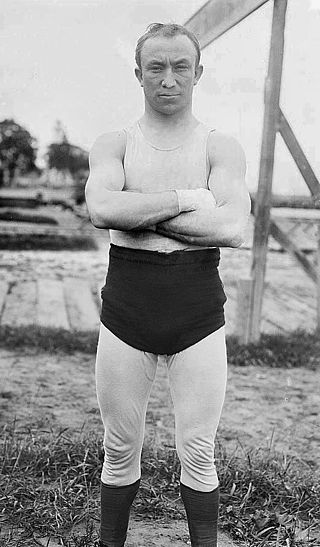
John Frederic Coulon was a Canadian-American professional boxer who was the world bantamweight champion from March 6, 1910, when he wrested the crown from England's Jim Kendrick, until June 3, 1914, when he was defeated by Kid Williams in Vernon, California. He was also a boxing manager late in life and managed, among others, Eddie Perkins.
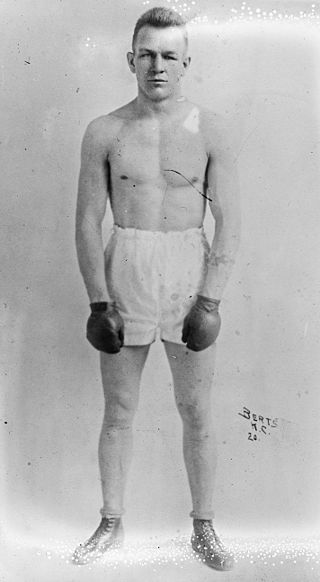
Billy Miske, alias The Saint Paul Thunderbolt, was a professional boxer from Saint Paul, Minnesota. During his tenure as a pugilist he had multiple-bout series with a plethora of all-time greats including Harry Greb, Jack Dempsey, Fred Fulton, Jack Dillon, Tommy Gibbons, Bill Brennan and Battling Levinsky, among others. Despite a career shortened by illness and an early death, statistical website BoxRec still lists Miske as the No. 26 ranked heavyweight of all time.
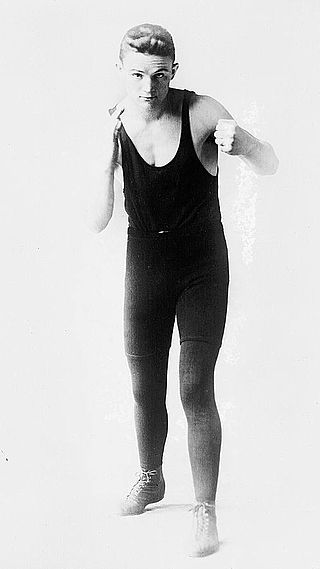
Thomas Joseph Gibbons was an American professional heavyweight boxer.
Brian Mitchell is a South African former professional boxer who competed from 1981 to 1995. He held the WBA super-featherweight title from 1986 to 1991, The Ring super-featherweight title from 1986 to 1988, and the IBF super-featherweight title from 1991 to 1992.

David "Bomber" Pearce was a Welsh heavyweight boxing champion.

Alan Scott LeDoux was a politician, professional heavyweight boxer, professional wrestler, and referee.
Sidney Terris was a top rated American lightweight boxing contender from the lower East Side of Manhattan. He excelled as an amateur, winning fifty straight bouts and taking Metropolitan, New York State, National AAU, and both National and International titles.

Maxie Berger was a Canadian boxer who fought as a flyweight, junior welterweight, and welterweight from 1935 to 1946. He squared off against many different Hall of Famers including the likes of Sugar Ray Robinson, Ike Williams, Beau Jack, Fritzie Zivic, Midget Wolgast, and Wesley Ramey. He held the Montreal version of the World Jr. Welterweight Title in 1939. His manager was Tommy Dio. Statistical boxing website BoxRec rates Berger as the 14th best Canadian boxer ever across all weight divisions.
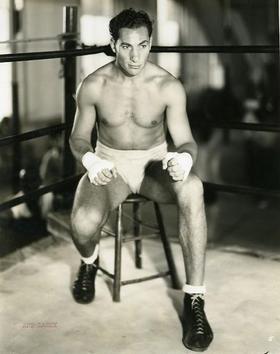
Arthur Lakofsky, also known as Art Lasky, was a heavyweight professional boxer from Minneapolis, Minnesota.
Rafael Rodriguez is a retired light middleweight professional boxer from Minneapolis, Minnesota.
Mike Morgan is a retired professional middleweight boxer from Minneapolis, Minnesota.
Neil Haddock is a Welsh former lightweight and super featherweight boxer. Before turning professional he won a silver medal as a lightweight at the 1986 Commonwealth Games. His early career as a professional lightweight was not very notable, but after a year out from boxing caused by an eye injury, he returned fitter and lighter as a super featherweight. In 1992 he became the Welsh super featherweight champion, taking the British title just five months later. He retired from boxing in 1994.
Tom Berry was an English professional light-heavy and heavyweight boxer active from the 1910s to the 1930s. He won the National Sporting Club (NSC) subsequently known as the British Boxing Board of Control, the British Light Heavyweight title and the British Empire Light Heavyweight title.

Frankie Neil was a World Bantamweight champion. Fighting at 114 1/2 pounds, he took the world title from reigning champion Harry Forbes on August 13, 1903, at the Mechanics Pavilion in San Francisco in a second-round knockout of a match scheduled for twenty rounds. Eddie Graney was the referee. Neil held the title only a little over a year, losing it on October 17, 1904, to British boxing champion Joe Bowker.

James John O'Hara was a commissioner and then executive secretary for the Minnesota Board of Boxing from 1976 to 2001. When O'Hara was appointed to the Minnesota Board of Boxing, he was a retired light heavyweight amateur and retired professional heavyweight boxer. O'Hara retired from the ring in 1953 with a claim to the Minnesota professional heavyweight title after a win over Don Jasper.
Ramon Antonio Nery is a Dominican former professional boxer, who was once ranked in the top ten in the world among Flyweight boxers by the World Boxing Association, and who once fought for the WBA's world Flyweight championship. At a regional level, Nery was the Dominican Republic's national Flyweight champion. Nery was born with deafness, and his boxing nickname was "sordito", which means "(little) deaf (person)" in Spanish. Nery's condition meant he had to have special lights installed on the ring's corners when he fought; that way he could tell when a round began or finished.











